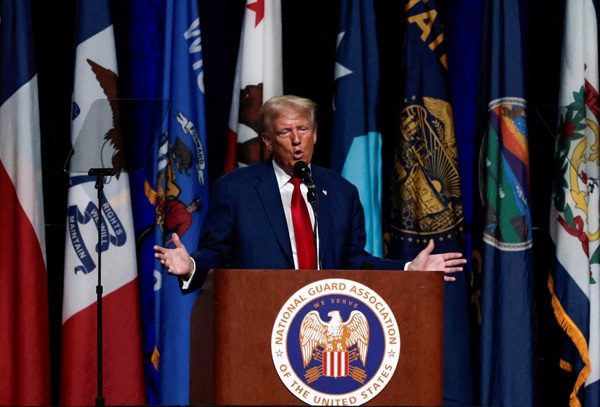 Republican presidential nominee and former US President Donald Trump speaks at the National Guard of the United States NGAUS General Conference in Detroit, Michigan US, 26 August 2024;
Credit: Reuters/Rebecca Cook
Republican presidential nominee and former US President Donald Trump speaks at the National Guard of the United States NGAUS General Conference in Detroit, Michigan US, 26 August 2024;
Credit: Reuters/Rebecca Cook
WASHINGTON (Reuters) - Vice President Kamala Harris' presidential campaign rejected Republican rival Donald Trump's assertion on Tuesday 27 August 2024, that the two sides had agreed to muted microphones at the 10 September 2024 US presidential debate.
The issue remains a matter of ongoing conversation with host network ABC, a Harris campaign official said.
In a social media post earlier on Tuesday, Trump said an agreement had been reached and that the rules for next month's debate would be the same as those at the 27 June CNN debate he had with President Joe Biden, whose poor performance led him to drop out of the 2024 race.
"The Debate will be 'stand up,' and Candidates cannot bring notes, or 'cheat sheets.' We have also been given assurance by ABC that this will be a 'fair and equitable' Debate, and that neither side will be given the questions in advance," Trump wrote.
The CNN debate did not have a live audience. Trump's post did not make any reference to that.
The Harris campaign indicated the debate terms were not settled. "Both candidates have publicly made clear their willingness to debate with unmuted mics for the duration of the debate to fully allow for substantive exchanges between the candidates - but it appears Donald Trump is letting his handlers overrule him. Sad!" the campaign said in a statement, mocking Trump's habitual use of "Sad" in his statements over the years.
ABC did not immediately respond to a request for comment.
The candidates' campaigns clashed on Monday over the previously agreed-upon debate, with the vice president's team seeking a return to open microphones while Trump threatened to pull out entirely after suggesting the network was biased.
Harris' campaign had said it wanted the broadcaster to keep the candidates' microphones on throughout the event instead of muted when their opponent was speaking as in the last presidential debate. So-called "hot mics" can help or hurt political candidates, catching offhand comments that sometimes were not meant for the public.
While Trump's team said it had already agreed to have closed microphones, Trump later told reporters that he preferred to have his microphone kept on.








